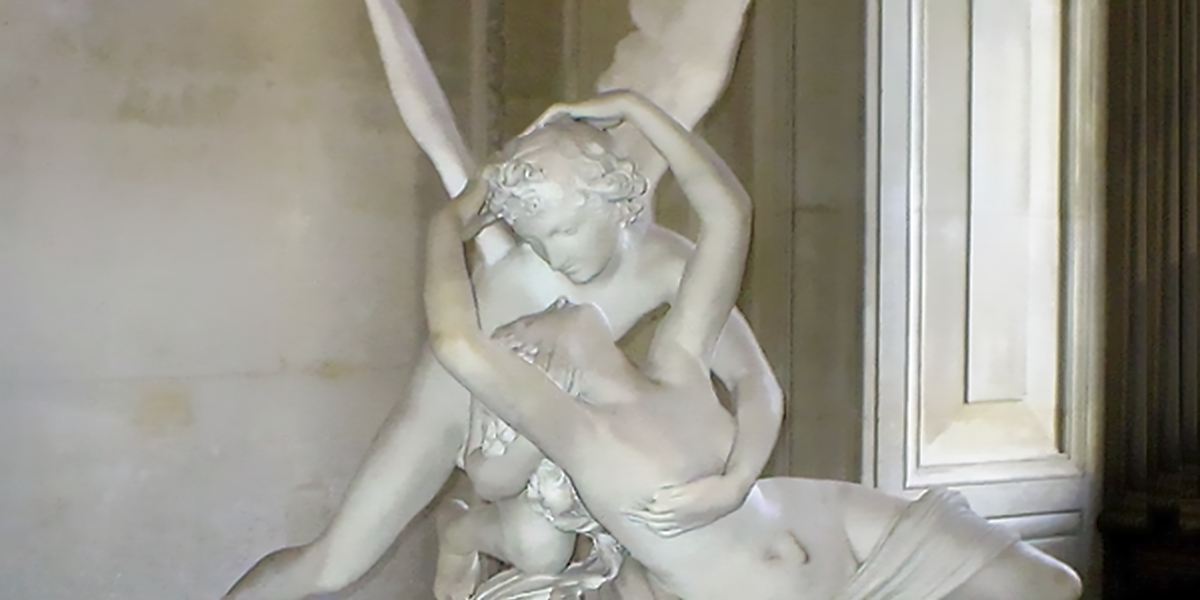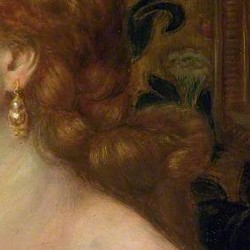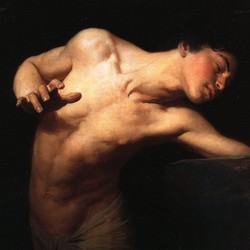
Hugo Wolf was particularly interested in writing Lieder from poetic sources not explored by other composers, such as Möricke, the Spanisches Liederbuch, or the Italienisches Liederbuch. When he began to work with a poet, it did it intensively, and so we have the fifty-three Lieder of the first cycle, the forty-four of the second or the forty-six of the third. And one day, on 27 October 1888, he began with Goethe; that's the Lieder series chronologically placed between Möricke and the Italienisches Liederbuch.
Of course, every composer had set Goethe's poemes previously, and it was hardly possible to surpass the Schubert contribution, seventy-four Lieder, assuming that it was Wolf's intention; he "only" wrote forty-three. He made an exception to his habit of not setting into music poems already musicalized, and wrote his versions of the harpist and Mignon's songs, but when he got into the West-östlicher Divan, perhaps because this collection is very extensive, he avoided the more popular poems. He wrote seventeen Lieder from this work, ten of which from poems of the Book of Suleika, not including the two best known by the Lied lovers, that is, those we heard as Suleika I and Suleika II in Schubert's version. But this does not mean that the author of these two poems, Marianne von Willemer, is not represented in the Wolf cycle, because he composed two other Lieder upon her poems: Nimmer will ich verlieren and Hochbeglückt in deiner Liebe.
That means, among other things, that Marianne von Willemer, whom we spoke about a few weeks ago, has been brilliantly set into music by Schubert, Schumann and Wolf, to mention only the most important names in a long list of important names. Not many poets can show off this, and I like to think that she knew the songs of her contemporaries: Schubert, Schumann and the Mendelssohns. Wolf wrote his Goethe-Lieder thirty years after Willemer's death and twenty years after Hermann Grimm published the article in which he revealed that she had written five of the poems of the West-östlicher Divan. Did Wolf know it? Probably not, because it took a long time to spread the news, and it was initially questioned; important references from the mid-20th century still wonder about the evidences that prove Willemer's (or Grimm's) story.
I suggest that we listen to the Goethe-Lieder n. 40, Hochbeglückt in deiner Liebe, composed on 23 January 1889. It is the reply of Suleika/Willemer to the previous Lied (and poem) by Hatem/Goethe, composed two days earlier, which begins with the words with which this article begins: "It isn't opportunity that makes a thief" and follows, "it is the greatest thief itself." Hatem says the opportunity stole all the love remaining in his heart, and he is now absolutely poor and dependent on Suleika; however, he sees compassion in her eyes, and enjoys a new life in her arms. I think Willemer's poem will be better understood after this short summary.
If you know some Lieder by Wolf, you may expect Hochbeglückt in deiner Liebe to have a lyrical and contemplative character like other of his love songs, but, precisely because of this prior knowledge, a hectic song with a complex piano part (the introduction is amazing, and the postlude, even more) wouldn't catch you unawares. The character indication at the score is Äußerst leidenschaftlich und sehr lebhaft (extremely passionate and very lively), but I don't feel that passion (the passion of Ein Traum by Grieg, for instance), but a joke air along the whole song. Maybe the dialogue between the two lovers makes me think of the playful tone we often hear in the next cycle he wrote, the Italienisches Liederbuch.
Hochbeglückt in deiner Liebe is a spectacular lied, which we're listening by Felicity Lott and Geoffrey Parsons. I chose this song because it will end the recital of Nathalie Pérez and Daniel Heide next Wednesday in Barcelona, at the Palau de la Música; the last part of the program will be dedicated to the West-östlicher Divan, and we're listening to eight Lieder with poems from this collection, composed by five composers during almost two hundred years. The regular readers of this blog would be familiar with the texts and their context!
Hochbeglückt in deiner Liebe
Schelt ich nicht Gelegenheit;
Ward sie auch an dir zum Diebe,
Wie mich solch ein Raub erfreut!
Und wozu denn auch berauben?
Gib dich mir aus freier Wahl;
Gar zu gerne möcht ich glauben –
Ja, ich bin's, die dich bestahl.
Was so willig du gegeben,
Bringt dir herrlichen Gewinn,
Meine Ruh, mein reiches Leben
Geb ich freudig, nimm es hin!
Scherze nicht! Nichts von Verarmen!
Macht uns nicht die Liebe reich?
Halt ich dich in meinen Armen,
Jedem Glück ist meines gleich.
Benaurada pel teu amor
no blasmo l'ocasió;
tot i que t' ha robat,
com m'alegra aital robatori!
Però, per què caldria robar?
Dóna't a mi lliurement;
em plauria molt creure...
Sí, que sóc jo, qui et robà.
El que tant generosament donares,
et retornarà un esplèndid guany,
la meva pau, la meva vida rica
et dono joiosa, accepta-les!
No facis broma! No parlis de pobresa!
Que potser no ens fa rics l'amor?
Quan et tinc entre els meus braços
La meva joia iguala la de qualsevol.
















